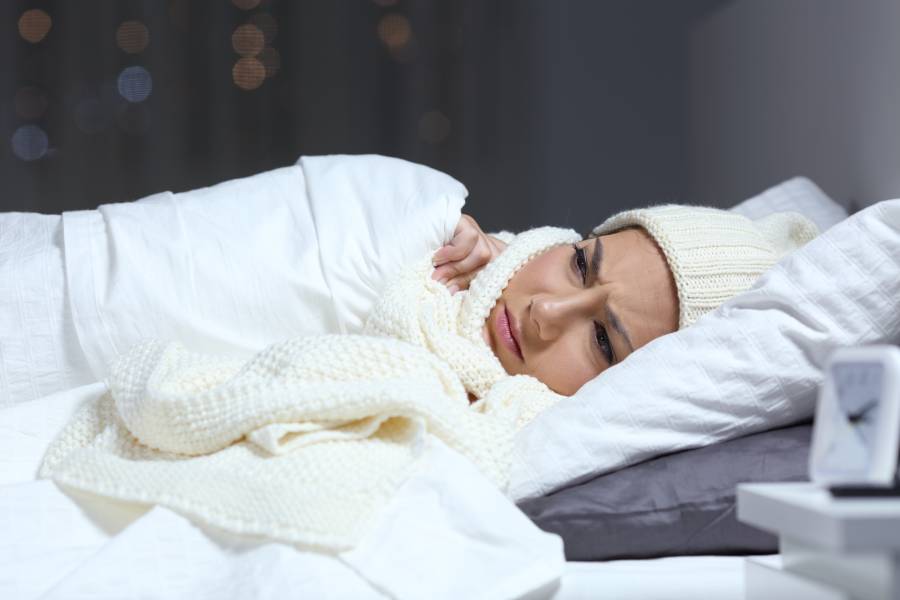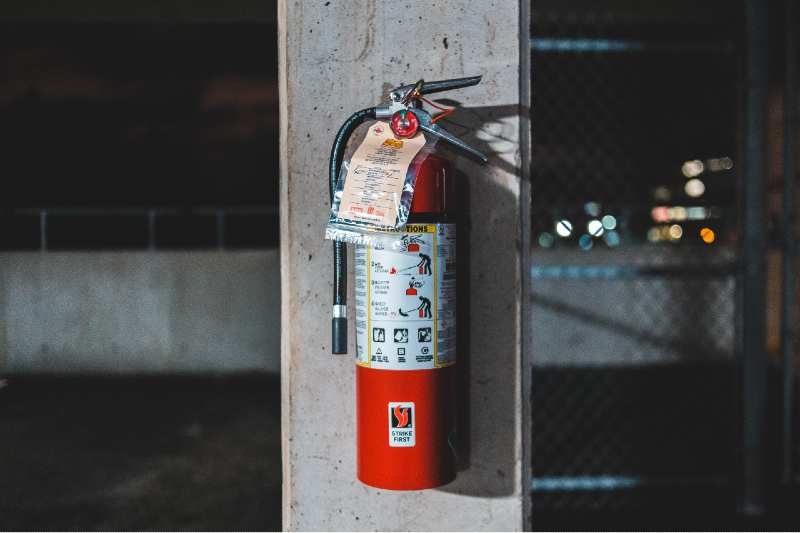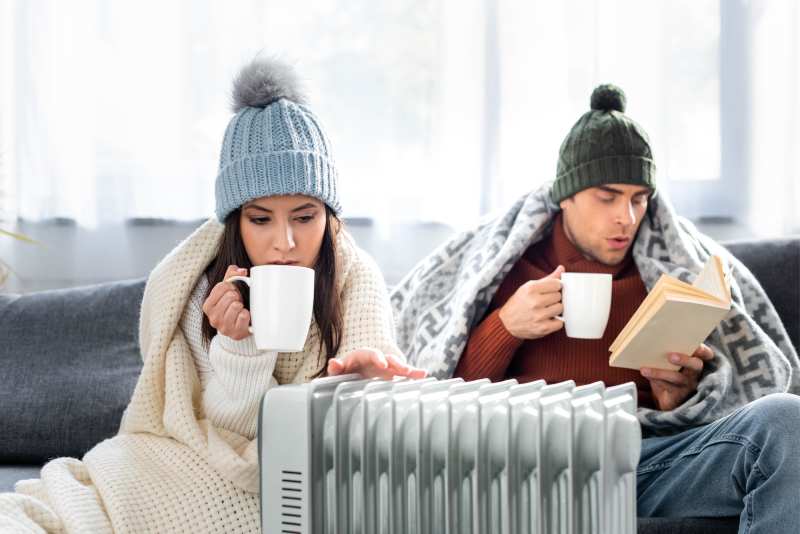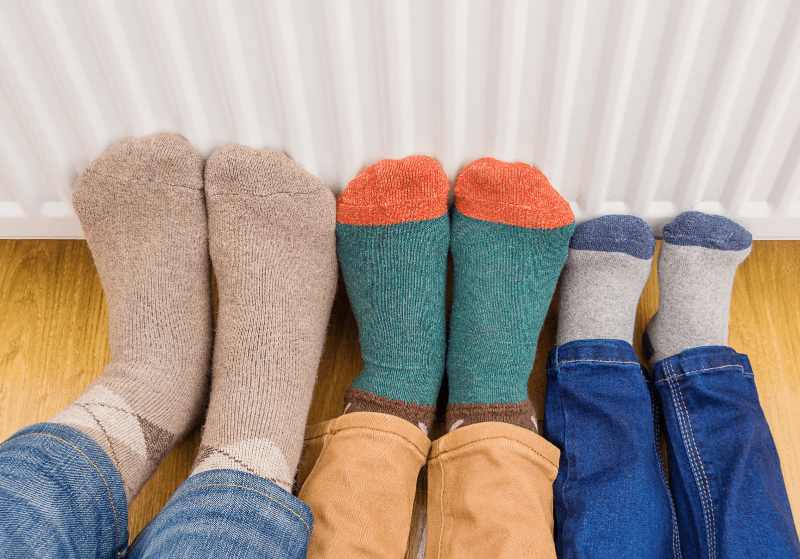Everyone loves feeling cozy indoors while it’s cold outdoors. But, leaving your space heater on for longer than a few hours might not be the best idea, no matter how tempting it may be. Leaving your heater unattended is a risky move that can have fatal consequences.
So, here’s the bottom line: Never leave your space heater unattended, and always turn it off before you go to sleep!
Today, I’ll deal with the ins and outs of how long it’s safe to leave your space heater on. There are several safety factors we should go through before reaching the final verdict. Let’s dig in!
Table of Contents
- How Do Space Heaters Cause Fires?
- Are Space Heaters Safe to Leave On All Night?
- What Happens If You Leave a Heater On All Day?
- Can a Space Heater Be Left Unattended
- Safety Features That Prevent Mishaps
- Safety Tips for Secure Electric Heating
- How Long Can Space Heaters Be Left On – The Verdict

How Do Space Heaters Cause Fires?
Did you know that heating equipment is the second highest cause of house fires in the United States? The National Fire Protection Association estimates that about 52,000 home fires happen due to heat equipment every year, especially in wintertime. Two out of five house fires are directly caused by space heaters, yet space heater accidents account for up to 86% of associated deaths.
These numbers sound quite scary, but the truth is that space heaters are quite safe. Most space heater fires happen due to improper use.
Some space heaters let out dangerous gases, but the main fire hazard comes from transferring heat to flammable materials around the heater itself.
Don’t worry – you will be safe if you exercise caution and follow basic safety rules.
Are Space Heaters Safe to Leave On All Night?
No. Never leave your space heater operating overnight or while you sleep. Even if you simply want to have a short afternoon nap, it’s important to turn off your space heater beforehand.
There’s a simple reason behind this crucial safety measure. If your space heater starts letting out smoke or overheats a nearby object while you’re awake, chances are you’ll notice the problem in time to prevent any serious damage.
When you’re asleep, you can’t rely on your sense of smell to notice the issue before the fire breaks out.
A Word On Gas Heaters
Gas space heaters can be even more dangerous. These models burn fuel to create heat, and a byproduct of this combustion is a dangerous gas called carbon monoxide. This gas has no color, taste, or smell, so it’s virtually unnoticeable. However, only a couple of hours’ worth of buildup can have fatal consequences: carbon monoxide poisoning. You shouldn’t use a gas space heater indoors at all – unless your large room is very well ventilated at all times, which is typically only true for garages and big workshops.

What Happens If You Leave a Heater On All Day?
Keeping your space heater turned on during the day is less dangerous than leaving it on overnight, but you should consider the costs before you do it. First and foremost, remember that you should never leave your space heater unattended while it’s on.
If you’re in the room, working, or going about your day, feel free to leave your space heater on for a few hours. Of course, make sure it’s at a safe distance from any flammable materials (like textile curtains and bedsheets), and follow other regular safety precautions (more on that later).
Some low and medium-quality units will overheat and turn off on their own after only a couple of hours of continuous work. If that happens, you simply need to turn the heater off for a while to let it cool. After it cools down, you can turn the heater back on. But remember that the power cord or the outlet should never be hot!
Can a Space Heater Be Left Unattended
Before you use any space heater, make sure that the model hasn’t been recalled due to safety concerns. You can do so on cpsc.gov and SaferProducts.gov.
Gas Space Heaters – Always Supervise
It doesn’t matter if they use natural gas, propane, butane, kerosene, or liquefied petroleum – gas space heaters let off carbon monoxide. This gas is completely colorless, odorless, and tasteless, so it’s difficult to detect in a room. As mentioned above, carbon monoxide poisoning is no joke and it can happen quickly.
Gas space heaters should not be used indoors, and they’re NOT safe to leave unattended. Make sure to install carbon monoxide detectors in any room where you use a gas heater.
Convective Space Heaters – Always Supervise
When we speak of electric space heaters, we typically refer to the so-called convective or convection space heaters. This type includes a metal or a ceramic heating unit on the inside and a fan that distributes warm air around the room.
This type of space heater is a popular choice because it’s affordable and warms up space quickly. However, it’s also the type that’s responsible for a lot of home fires, so it’s NOT safe to leave a convective heater unattended. Install smoke alarms on every floor of your home to detect any fire hazard in time.
Infrared (Radiant) Space Heaters – Supervise
Infrared space heaters work in a very specific way. Instead of creating heat inside the machine, the infrared waves from the heater warm up the objects they hit. So, instead of warming up the air around you, infrared waves warm up your skin and your furniture – whatever’s nearby.
An infrared heater warms up any other object on its path – which can quickly cause a fire. You should NOT leave infrared heaters unattended.
Oil Space Heaters – A Safer Bet
Oil heaters resemble regular radiators, ones that look like a part of the central heating system, but the body is filled with oil which is heated up using electricity.
An oil heater warms up quickly and stays hot for a while. It cools down slowly, warming the air around it. Oil space heaters utilize a built-in thermometer to turn the heating on and off as needed. Because of this feature, oil space heaters with working thermometers are safer to leave unattended than any other type of space heater.
Follow general safety rules and set up your thermometer to a lower temperature if you’re taking a nap. Remember to unplug your oil heater if you’re heading out.

Safety Features That Prevent Mishaps
Modern space heaters come with safety features that reduce the chances of an accident. Make sure that the model that you want to purchase has these – they’ll keep you safe.
Automatic Thermostat
A thermostat measures the temperature in or around the heater. Most space heaters have thermometers, but only some of them let you control their settings.
An automatic thermostat turns your heater on or off according to the temperature. If you set it up to 70°F, the thermostat automatically shuts off the heater when the air reaches room temperature, and turns the heating back on when your room cools down. An automatic thermostat is essential if you want to leave your heater on for a long time.
Overheating Safety
Overheating safety is a must-have feature. Many space heaters automatically shut off if the device overheats. This may happen if something (e.g. curtains) accidentally covers the unit, not letting the fans maintain a safe, steady temperature.
Sometimes, low-quality electric heaters overheat if they merely stay on for a long time. The heater should stay off while the materials inside the unit cool down. However, to truly avoid a potential fire hazard, get yourself a reliable space heater.
Tip-over Protection
Some units are programmed to automatically turn off, in case the space heater tips over and falls. This may happen when children or pets play around the heater or in unforeseen circumstances like earthquakes.
While the fan continues working in such cases, the heating units get shut off immediately, so this is a must-have feature that can prevent a fire from breaking out.
Space Heater Timer
A timer is nice to have because it automatically turns off the space heater after a specific amount of time. Set it up to turn off the heat after an hour or two if you like to doze off while your heater keeps you warm.
Avoid using a power strip or an extension cord!
Only the strong, heavy-duty (14-gauge) extension cords should be used with Heating equipment. If you do not own such a cable, the safest bet would be to plug the heater directly into the outlet. There are many rules on how to handle heaters safely, which brings us to our next topic…

Safety Tips for Secure Electric Heating
- Keep any combustible materials at least 3 feet away from the heater.
- Place your heater on a flat and hard surface where it won’t tip over or fall.
- Don’t leave children, elderly and disabled people, or pets unattended in a room with a heater on.
- Install a fire alarm on every floor of your home, and carbon monoxide detectors if you use a gas heater.
- Always plug your electric space heater into the wall outlet directly. Don’t use a power strip or an extension cord, except for the heavy-duty 14-gauge ones. Check whether the heater plug, cords, and wall outlet faceplate get hot during use – if that happens, stop the heater immediately and call a qualified electrician.
- Keep your space heater away from water – don’t use it in the bathroom or kitchen.
Additional Tips for Gas Heaters
- Always use the recommended fuel for your space heater. DON’T substitute the proper kind of gas for another type of fuel.
- Don’t refuel the heater while it’s turned on.
- Always keep a window or a door open to avoid a buildup of dangerous combustion byproducts in the air around you.
How Long Can Space Heaters Be Left On – The Verdict
Everyone likes getting cozy with a cup of tea, a good book, and a space heater to keep them warm. Following basic safety guidelines when operating your space heater will make sure you stay safe and warm this winter, without fear of accidents. An ounce of prevention is worth a pound of cure!
At The Home Dweller, we do a lot of research to help you stay comfy and safe at home. If you found the information here useful and actionable, consider helping us out by sharing this article with your friends on social media!


Great advice! Thanks for sharing! 🙂